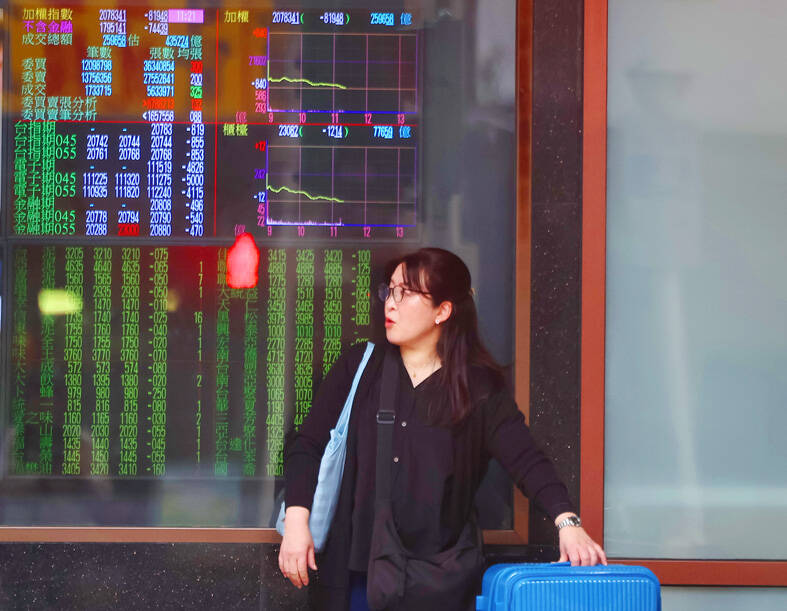The TAIEX yesterday plunged 4.2 percent, or 906.99 points, to an eight-month low of 20,695.9 — its fourth-steepest single-day drop — as investors offloaded risky assets ahead of US President Donald Trump’s expected announcement of reciprocal tariffs on Wednesday.
The benchmark index lost 10.2 percent, or 2,357 points, last month, wiping out a modest 0.08 percent gain from the first two months of the year, as capital flight intensified.
Financial Supervisory Commission Chairman Peng Jin-lung (彭金隆) and Deputy Minister of Finance Frank Juan (阮清華) attributed the rout to global jitters over the proposed tariffs, which Trump said are aimed at addressing the US’ long-standing trade deficit.

Photo: CNA
The tariffs are expected to raise production costs and weigh on global growth — a negative development for Taiwan’s export-driven economy, said Juan, who also serves as executive secretary of the National Stabilization Fund committee.
The government would activate the NT$500 billion (US$15.07 billion) fund if necessary to support the local bourse, Juan told lawmakers at a meeting of the legislature’s Finance Committee.
Peng said that corporate earnings matter more in driving the TAIEX’s performance, and the recent market correction has made local equities more attractive, compared with the price-earnings ratio of 20.46 times in late February.
Heavyweight tech stocks bore the brunt of the sell-off. Taiwan Semiconductor Manufacturing Co (TSMC, 台積電) dropped 4.41 percent, MediaTek Inc (聯發科) slid 5.12 percent and Hon Hai Precision Industry Co (鴻海精密), a major iPhone assembler, fell 5.19 percent.
Exchange-traded funds known for distributing quarterly cash dividends also sustained significant losses.
The capital flight exerted pressure on the New Taiwan dollar, which weakened NT$0.085 to close at NT$33.182 against the US dollar, central bank data showed.
Central bank Deputy Governor Chu Mei-lie (朱美麗) told lawmakers that the local currency remained relatively stable, depreciating just 1.09 percent against the US dollar last month, despite capital outflows exceeding NT$600 billion. By comparison, South Korea’s won fell 1.66 percent over the same period.
The Taiwan Stock Exchange yesterday urged investors to remain calm and assess external developments with caution and rationality, saying that strong global demand for chips used in the development of artificial intelligence has driven local semiconductor companies’ combined revenue to grow 25.42 percent year-on-year in the first two months of the year.

‘SWASTICAR’: Tesla CEO Elon Musk’s close association with Donald Trump has prompted opponents to brand him a ‘Nazi’ and resulted in a dramatic drop in sales Demonstrators descended on Tesla Inc dealerships across the US, and in Europe and Canada on Saturday to protest company chief Elon Musk, who has amassed extraordinary power as a top adviser to US President Donald Trump. Waving signs with messages such as “Musk is stealing our money” and “Reclaim our country,” the protests largely took place peacefully following fiery episodes of vandalism on Tesla vehicles, dealerships and other facilities in recent weeks that US officials have denounced as terrorism. Hundreds rallied on Saturday outside the Tesla dealership in Manhattan. Some blasted Musk, the world’s richest man, while others demanded the shuttering of his

ADVERSARIES: The new list includes 11 entities in China and one in Taiwan, which is a local branch of Chinese cloud computing firm Inspur Group The US added dozens of entities to a trade blacklist on Tuesday, the US Department of Commerce said, in part to disrupt Beijing’s artificial intelligence (AI) and advanced computing capabilities. The action affects 80 entities from countries including China, the United Arab Emirates and Iran, with the commerce department citing their “activities contrary to US national security and foreign policy.” Those added to the “entity list” are restricted from obtaining US items and technologies without government authorization. “We will not allow adversaries to exploit American technology to bolster their own militaries and threaten American lives,” US Secretary of Commerce Howard Lutnick said. The entities

Minister of Finance Chuang Tsui-yun (莊翠雲) yesterday told lawmakers that she “would not speculate,” but a “response plan” has been prepared in case Taiwan is targeted by US President Donald Trump’s reciprocal tariffs, which are to be announced on Wednesday next week. The Trump administration, including US Secretary of the Treasury Scott Bessent, has said that much of the proposed reciprocal tariffs would focus on the 15 countries that have the highest trade surpluses with the US. Bessent has referred to those countries as the “dirty 15,” but has not named them. Last year, Taiwan’s US$73.9 billion trade surplus with the US

Prices of gasoline and diesel products at domestic gas stations are to fall NT$0.2 and NT$0.1 per liter respectively this week, even though international crude oil prices rose last week, CPC Corp, Taiwan (台灣中油) and Formosa Petrochemical Corp (台塑石化) said yesterday. International crude oil prices continued rising last week, as the US Energy Information Administration reported a larger-than-expected drop in US commercial crude oil inventories, CPC said in a statement. Based on the company’s floating oil price formula, the cost of crude oil rose 2.38 percent last week from a week earlier, it said. News that US President Donald Trump plans a “secondary